Per Olsson is a member of Rättvisepartiet Socialisterna (ISA in Sweden).
The World and Sweden have never been so unequal. 81 billionaires hold more wealth than 50% of the world combined. Since 2020 the wealth grab by the super-rich has accelerated, and the richest 1% have captured almost two-thirds of all new wealth. This is six times more than the bottom 90% of humanity.
While the number of poor and hungry people in the world is rising, the fortunes of dollar billionaires are increasing by more than $2.7 billion a day.
Two-thirds of all wealth generated since 2020 has gone to the richest 1% — twice as much as the remaining 99% of the world’s population shared in the same period.
In Sweden, only five people own more than five million people combined, according to the charity Oxfam, which is calling for new taxes to be levied on the super-rich and corporate profits.
In the midst of the worst cost-of-living crisis in decades, energy and food giants have made record profits. “Food and energy companies more than doubled their profits in 2022, paying out $257bn to wealthy shareholders, while over 800 million people went to bed hungry” writes Oxfam in its latest inequality report, The Survival of the Richest, published as the global elite started its annual World Economic Forum in Davos.
New Oxfam research also shows that the richest are key contributors to climate breakdown: a billionaire emits a million times more carbon than the average person.
Growing Inequality Fuels Radicalisation
This year’s Oxfam report is not only bursting with facts and arguments but also has a clearer anti-capitalist edge than in the past.
The very introduction states that: “We are living through an unprecedented moment of multiple crises. Tens of millions more people are facing hunger. Hundreds of millions more face impossible rises in the cost of basic goods or heating their homes. Climate breakdown is crippling economies and seeing droughts, cyclones and floods force people from their homes. Millions are still reeling from the continuing impact of COVID-19, which has already killed over 20 million people. Poverty has increased for the first time in 25 years. At the same time, these multiple crises all have winners. The very richest have become dramatically richer and corporate profits have hit record highs, driving an explosion of inequality.”
It is a bleak but true description of the world today. But as the report indicates, if only in passing, there are also reasons for optimism. The tide has started to turn. The grotesque widening class divide, the failure of a capitalist system ridden by poly-crises, leads to determined struggles of workers and youth, mass revolts and a change in consciousness.
Or, as the report says: “Taxing the rich is a wildly popular idea. Polling in the US shows that in the last decade, for the first time, the majority of Americans have begun to agree that their ‘government should redistribute wealth by heavy taxes on the rich’. An estimated 80% of Indian citizens are in favour of increasing taxes on the rich, and 85% of Brazilians are in favour of increasing taxes on the super-rich to finance essential services.”
Alongside rising poverty and inequality, more and more countries are being weighed down by a growing, more expensive debt burden and austerity measures. “It is projected that one-fifth of ‘developing countries’ will have a lower per capita GDP in 2023 than in 2019. Many are also in an increasingly vulnerable position because of spiralling debts: rising interest rates against a strengthened US dollar are driving up the cost of debt servicing to unsustainable levels.
“Today, 25% of ‘emerging’ economies and 60% of low-income countries are in or near debt distress. The poorest countries spend four times more on paying off their debts — often to rich, private lenders — than on health care. Many are also planning major austerity measures. According to Oxfam’s estimates, three-quarters of the world’s governments are planning to cut spending, with a combined saving of $7.8 trillion,” writes the report.
Super-Rich Benefit from Rigged Tax System
The report focuses on taxes, recognising that “never has there been a greater need to increase public spending to tackle poverty, hunger, climate change and inflation.” But tax increases alone will not be able to tackle the social crisis and the horrors of capitalism, let alone reach the aim to “abolish billionaires altogether, as part of a fairer, more rational distribution of the world’s wealth.”
However, taxing the rich and big business and a progressive tax system has always been part of the workers movement’s program. “A heavy progressive or graduated income tax” was, for example, one of ten demands listed in the Communist Manifesto — the first program for the international workers’ movement — written by Karl Marx and Friedrich Engels 175 years ago.
The present tax-system is not progressive but the opposite. Top rates of tax on income have become lower and less progressive, with the average tax rate on the richest falling from 58% in 1980 to 42% more recently in OECD countries. Across 100 countries, the average rate is even lower, at 31%.
This in turn means that ordinary people are left with an increasing share of the tax revenue.
Even the capitalist OECD had to admit in 2015 that:” Corporate tax revenues have been falling across OECD countries since the global economic crisis [2007–2009], putting greater pressure on individual taxpayers to ensure that governments meet financing requirements, Average revenues from corporate incomes and gains fell from 3.6% to 2.8% of gross domestic product (GDP) over the 2007–14 period. Revenues from individual income tax grew from 8.8% to 8.9% and VAT revenues grew from 6.5% to 6.8% over the same period.” (Corporate tax revenues falling, putting higher burdens on individuals, OECD December 2015)
Tax injustice is the result of decades of neoliberalism and the global race to the bottom in corporate taxes, taxation of the wealthy and capital income, as well as in wages, working conditions and environmental legislation. Globally, taxes on income and consumption account for more than 80% of all tax revenues, while taxes on corporations account for only about 14% and taxes on wealth/capital for a paltry 4%.
Two-thirds of countries do not have any form of inheritance tax on wealth and assets passed to direct descendants. Half of the world’s billionaires now live in countries with no such tax, meaning $5 trillion will be passed on tax-free to the next generation, a sum greater than the GDP of Africa.
As the already rich get richer, the less they pay in actual taxes. At the same time, since the early 1990s, corporate taxes have fallen by an average of one percentage point per year. In Sweden, the corporate tax rate was 58% in the 1980s. Now, it is down to 20%. The tax-to-GDP ratio in Sweden has decreased from 50.0% in 2000 to 42.6% in 2021 emptying the state coffers.
Sweden is the country in the Western world that has reduced taxation on wealth and assets the most since the early 1990s, with the result that a top executive pays less tax as a percentage than many workers. In the US, billionaires have paid below 5% in taxes (federal income tax rate) in recent years, because: “Many of the richest Americans derive most of their wealth from their assets — things like stocks and bonds. Those are only taxed when they’re sold off as capital gains. Even then, they’re taxed at the lower capital gains rate.” (Business Insider, May 19, 2022)
That is why Jeff Bezos — one of the richest men in the world — had been paying a “true tax rate” of less than 1% (0.98%).
This is why Oxfam proposes: “A wealth tax of 2% for the world’s dollar millionaires, 3% for those whose wealth exceeds $50 million and 5% for the world’s billionaires would yield $1.7 trillion a year. That would be enough to lift 2 billion people out of poverty.”
The proposed increase is modest and will only “bring billionaire wealth and numbers back to where they were just a decade ago in 2012.” Tax rises alone are not enough to “transform the economy so that it is no longer rigged in favour of the very rich” and abolish a system that is both “broken and outdated.” More far-reaching measures are needed to enable a rapid and drastic redistribution of wealth from capitalists to workers and the poor, and to fund welfare and a green transition.
Taxing Big Business and the Super-Rich Requires a Movement and Program
ISA, of course, fights and supports the demands for taxation of the rich and the big corporations. Socialist City Council member Kshama Sawant and Socialist Alternative (ISA’s sympathisers in the US) played a crucial role in the successful fight for an Amazon tax in Seattle. Thanks to the struggle and the building of a grassroots movement, the Seattle City Council passed a historic tax on Amazon and other big corporations to fund permanently-affordable, publicly-owned housing in 2018. But, after a vicious campaign by Amazon and the Chamber of Commerce, the decision was later shamefully overturned by the majority of the Council. But the continuing struggle managed to beat back that attack and in 2020 the Amazon tax was reintroduced.
“The vote to pass an Amazon Tax in Seattle is a historic victory for working people. This victory was hard fought and it was hard won.
“The ONLY reason this passed is because of the strength of our movement. A movement that wouldn’t give up, and that faced down a seemingly endless series of obstacles: from the shameful attempts of corporate Democrats in the State Legislature to pass a ban on municipal big business taxes, to unfounded delays in the City Council, to a pandemic and lockdown which prevented signature gathering, to relentless attacks in the corporate media in Seattle and nationally. We are winning because of the determination of workers and socialists to smash all obstacles and find a path to victory,” commented councillor Kshama Sawant (member of Socialist Alternative) after the decision was taken in July 2020.
The ISA in Sweden, Rättvisepartiet Socialisterna (Socialist Justice Party) have long called for increased taxation of the super-rich, higher corporate and capital income taxes, a new property tax and to reintroduce tax on inheritance and wealth as part of a socialist program and struggle to abolish capitalism. Now we are campaigning for scrapping VAT on food and other necessities to counter the cost-of-living crisis.
There is strong support for taxing the rich, and under the pressure of mass struggles, governments may be forced to raise corporate taxes and the taxation of the super-rich, as happened during the 1930s crisis. Such policies will of course face resistance and blackmail from those with wealth and privilege to defend, and therefore increased taxation needs to be combined with a halt to capital flight, the nationalisation of the banks and the confiscation of all the wealth of individuals who try to evade the tax or flee the country with their wealth.
Despite its political limitations and the fact that the report completely overlooks the organising and struggle required to push through its demands, it should be read by every socialist. The facts given are an indictment of capitalism. They also offer a picture of the wealth and resources that exist and what would be possible with revolutionary socialist politics.
The ongoing global struggle holds the way to another world — a socialist world. Capitalism can only be abolished by a conscious, well-organised mass movement, strengthened not only by its numbers and determination, but above all by its political program.
It is such a mass movement that International Socialist Alternative, together with others, wants to build in order to overthrow capitalism and create a socialist world.




